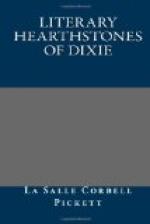On a second floor passage was an object which must have excited more envy than the magnificent mirrors and solid old furniture were capable of arousing—a bag of Java coffee, and coffee thirty dollars a pound—the latter fact not deterring the luxurious owner of this stately abode from imbuing his pet terriers with the coffee-drinking habit. A little room cut off from a passage in the third story was a library of old and rare editions of the classics. A back room, sunlit and warm, gave a view of James River, the Henrico Hills, and the spacious dells and forests of Chesterfield. To the mind of Dr. Bagby all these things were represented by “John M. Daniel’s Latchkey” and, for all the charm of “Home, Sweet Home,” is it not better to have the privileges without the responsibilities of a latchkey?
Next to the editorial office of the Messenger that of the Daily Examiner was the place with which Dr. Bagby was, perhaps, best acquainted in Richmond. There, with the fiery editor, he spent his evenings in reading proof, comforted by a mild cigar and protected by a Derringer which Mr. Daniel would put on the table when he first arrived, a not unnecessary precaution, for if there was one place more dangerous than another in the Richmond of war days it was almost any point in the near vicinity of the belligerent editor of the Examiner.
Dr. Bagby was married to Miss Parke Chamberlayne of Richmond, and we may be sure that she was the model from which he drew his charming study of “the Virginia lady of the best type,” who accompanies “The Old Virginia Gentleman” in his pages.
After the close of the war Dr. Bagby attained high distinction as a lecturer on Southern topics and later served his State as assistant secretary. But in all that he did there was with him the lost dream of the nation he had served so well through the dark and stormy years of strife, and in August, 1883, he passed beyond into the land where earth’s broken hearts are renewed to youth.
It was written of him: “There is no man left in Virginia fit to lift the lid of his inkstand.”
“WOMAN AND POET”
MARGARET JUNKIN PRESTON
“Whoever has the good fortune to follow its trails and shimmering waters is already half a poet,” wrote Professor Harris of the road that leads down from the verdant hills of the Alleghanies over picturesque gorge and crag and fissure into the quiet of the valley and brings us by exquisite stages to the beautiful town of Lexington, Virginia. Making that journey in taking my boy, fourteen years old, to the Virginia Military Institute, I entered at once two charming regions—Lexington with its romantic environment, and the heart of Margaret Junkin Preston.
When I spoke of the beautiful scenery Mrs. Preston asked me if I had read Professor Maury’s description of it. I replied that I had not. “I am glad,” she said, “because now that you have seen our Nature-pictures you will enjoy the description so much more.”




